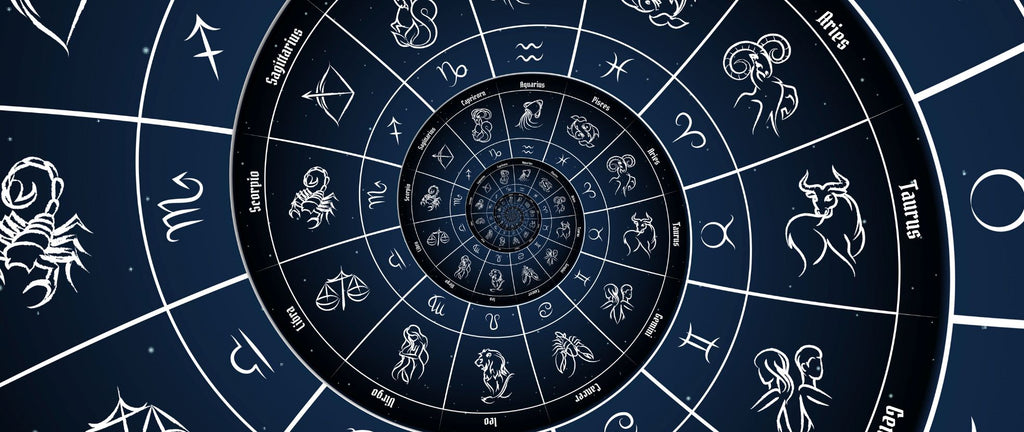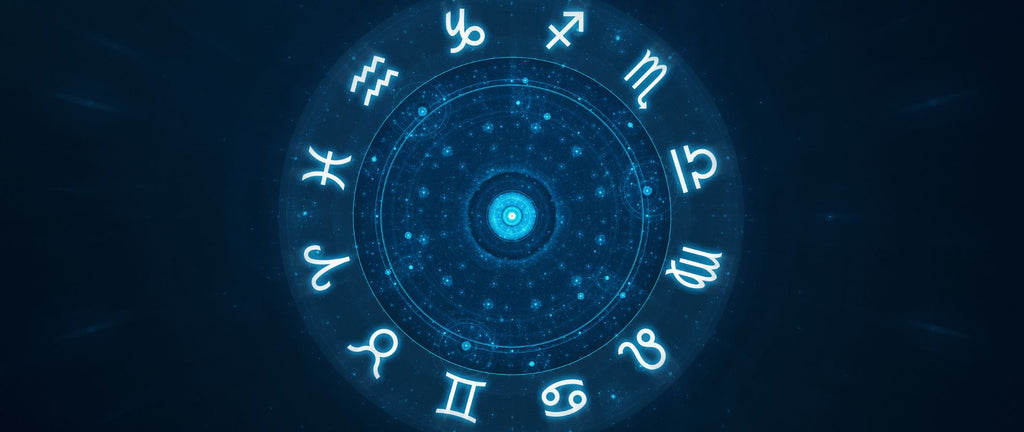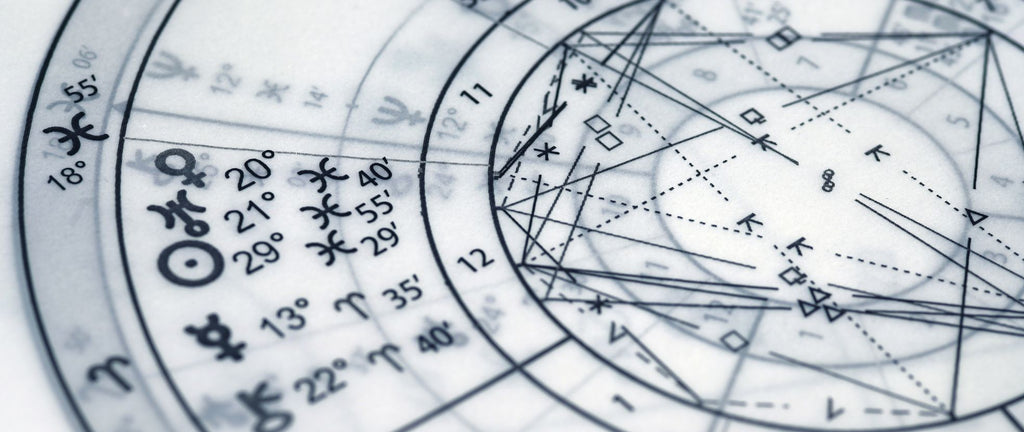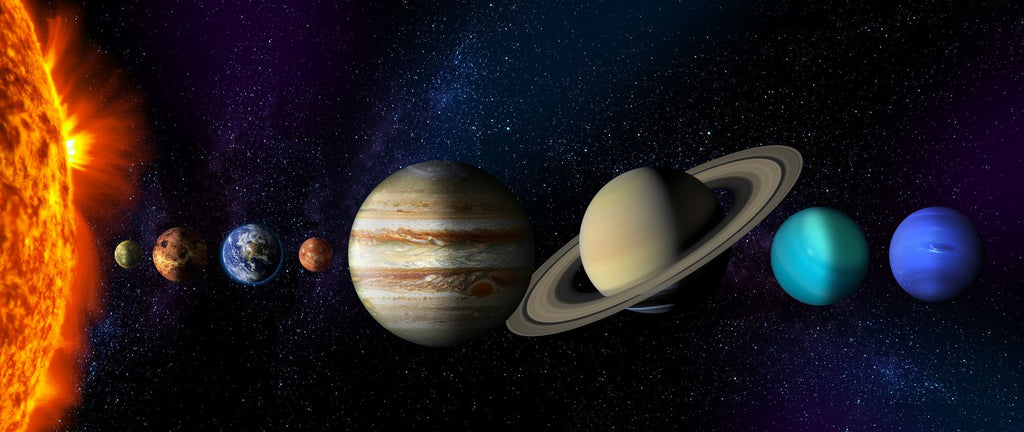Astrology, often regarded as the celestial language of the universe, has captivated human minds for millennia. This ancient and intricate belief system revolves around the idea that the positions and movements of celestial bodies, such as planets and stars, exert a profound influence on our lives and personalities.
Astrology serves as a cosmic roadmap, offering insights into our character traits, life's purpose, and the intricate web of connections that bind us to the cosmos. Whether you approach it with unwavering faith or a healthy dose of skepticism, astrology remains a fascinating and enduring subject that continues to shape how we perceive ourselves and the world around us.
In this exploration, we delve into the mystical realm of astrology, zodiac signs, birth charts, planetary retrogrades, and how astrology can influence your personal growth.

Astrology
Astrology is an ancient form of divination rooted in the belief that the movements and positions of celestial bodies, such as stars and planets, exert a significant influence on human destinies and earthly affairs.
Initially inseparable from astronomy, its origins trace back to Mesopotamia around the 3rd millennium BC and later spread to India. However, it found its Western form during the Hellenistic period in Greek civilization. Astrology entered Islamic culture through the Greek tradition and was reintroduced to European culture via Arabic learning in the Middle Ages.
According to the Greek tradition, the heavens are divided into 12 constellations of the zodiac, and the rising bright stars at intervals are believed to cast a spiritual influence over human lives. This practice was also prominent in ancient China, where horoscopes were routinely cast for newborns and pivotal life moments during imperial times.
Despite the Copernican revolution challenging the geocentric worldview astrology relies on, it has endured into modern times, with astrological signs still widely believed to impact personality traits.

Zodiac Signs
Astrology encompasses 12 distinct zodiac signs, each possessing unique attributes, strengths, weaknesses, desires, and outlooks on life and interpersonal relationships. Through a meticulous study of planetary positions, including those of the Sun and the Moon along the Ecliptic at birth, astrology offers valuable insights into an individual's fundamental nature, inclinations, imperfections, and apprehensions.
Astrology categorizes the 12 horoscope signs into four elemental groups: Air, Fire, Water, and Earth. These elements signify fundamental energies within us. The goal of astrology is to guide us in harnessing these energies positively, gaining insight into our strengths and potential, and effectively managing our weaknesses. Each element shapes distinct personality traits, emotions, behavior, and thought patterns, offering a deeper understanding of individual characteristics.
The Zodiacs in Their Elements
When zodiac signs come to mind, our initial association tends to be with horoscopes. Zodiac signs are not merely a daily horoscope; they are complex archetypes, each with its unique qualities and characteristics that provide a rich framework for understanding human behavior, relationships, and life's unfolding journey. The following is a brief introduction to the sun signs.
Water signs (Cancer, Scorpio, and Pisces) are known for their deep emotional sensitivity and intuition. They are empathetic, compassionate, and often attuned to the feelings of others, making them natural nurturers and supportive friends. However, they can also be prone to moodiness and may struggle with setting boundaries due to their empathetic nature.
Earth signs (Taurus, Virgo, and Capricorn) are the stable and grounded members of the zodiac. Known for their practicality and reliability, they excel in matters of the material world and are often associated with a strong work ethic. Earth signs are highly detail-oriented and thrive in structured environments. They can be counted on for their steadfastness and ability to bring projects to fruition, which can sometimes be perceived as stubbornness.
Fire signs (Aries, Leo, and Sagittarius) are the energetic and dynamic members of the zodiac. They are characterized by their passion, enthusiasm, and a zest for life. Fire signs are known for their adventurous spirit and love of challenges.
They are often natural leaders, unafraid to take risks and pursue their goals with vigor. However, they may sometimes struggle with impulsiveness and can be prone to impatience. Fire signs thrive in situations that allow them to express their creativity and individuality.
Air signs (Gemini, Libra, and Aquarius) are the intellectual and communicative members of the zodiac. They are characterized by their sharp intellect, love for ideas, and social nature. Air signs excel in communication and are often skilled in articulating their thoughts and ideas.
They have a natural curiosity and are drawn to intellectual pursuits. Air signs value fairness and harmony in their relationships, and they are often skilled diplomats and mediators. They thrive in environments that stimulate their intellect and encourage free expression of ideas.
Once you've familiarized yourself with your zodiac sign, delving into your birth chart offers a more intricate and personalized perspective on your astrological makeup.

Understanding Your Astrology Chart
An astrological birth chart, also known as a natal chart, is a personalized map that recreates the celestial positions at the moment of one's birth. It utilizes the precise date, time, and location of birth to depict the planets and celestial objects, as well as the zodiac signs they were in at that specific moment. This chart provides a unique snapshot of the sky's configuration during one's arrival on Earth.
In the past, calculating a birth chart was a manual process involving tools like protractors and ephemerides. Now, with astrology software like TimePassages (available on IOS and Android), it's a swift and seamless experience. This app is my personal favorite, swiftly generating birth charts and offering fascinating insights with ease.
To generate a birth chart, you'll need the exact date, time, and place of birth. Birth charts are a sensitive map that changes approximately every four minutes, so having the exact information is crucial for accuracy.
Viewing your birth chart can be overwhelming. It's packed with symbols, numbers, and intricate lines, akin to deciphering ancient hieroglyphics. Astrology, a visual language with a millennia-long history, requires practice and patience to grasp its complexities.
The chart is divided into 12 houses, representing Earth's 24-hour rotation. Each house signifies a different life aspect, transitioning from personal to social. Familiarize yourself with these areas using the provided keywords.
The 1st House often called the Ascendant or Rising sign, represents your outward persona, physical appearance, and initial impression on others. It offers insights into your self-image, approach to the world, and how you project yourself to those around you.
The 2nd House is referred to as the house of possessions. It signifies income which includes finances, personal belongings and possessions as well as investments.
The 3rd House governs communication, intellect, and immediate surroundings. It sheds light on how you express yourself, your learning style, and your relationship with siblings and neighbors.
The 4th house symbolizes your home, family, roots, and emotional foundation. It offers insights into your sense of security, family dynamics, and the environment in which you feel most grounded.
The 5th house is associated with creativity, self-expression, romance, and leisure pursuits. It provides insights into your artistic talents, approach to love affairs, and the activities that bring you joy and fulfillment in life.
The 6th house signifies health, daily routines, work ethic, and service to others. It provides insights into your approach to maintaining well-being, your work habits, and how you contribute to the betterment of your immediate environment.
The 7th house represents partnerships, relationships, and collaborations. It sheds light on your approach to one-on-one connections, whether in romantic, business, or platonic contexts, and how you navigate the dynamics of mutual cooperation.
The 8th house signifies transformation, shared resources, intimacy, and deeper emotional connections. It provides insights into how you approach profound change, handle joint finances, and engage in intimate relationships, shedding light on the depth of your emotional bonds.
The 9th house is associated with higher learning, travel, philosophy, and expanding one's horizons. It offers insights into your pursuit of knowledge, spiritual beliefs, and adventurous spirit, indicating how you seek to broaden your intellectual and cultural experiences.
The 10th house represents career, public image, and ambition. It offers insights into your professional aspirations, how you present yourself to the world, and your drive for success and recognition in your chosen field.
The 11th house is associated with friendships, social networks, and aspirations. It provides insights into your approach to group dynamics, your ideals, and your involvement in collective endeavors, offering a glimpse into your role within larger communities.
The 12th house signifies introspection, spiritual pursuits, and the subconscious mind. It provides insights into your inner world, hidden strengths and vulnerabilities, and your connection to the spiritual realm, offering a deeper understanding of your unconscious motivations and spiritual journey.

The Planets
One aspect of astrology that I particularly cherish is my affinity for the planets. They hold a special place in my heart, and I often find meaningful connections with them. It's as if the universe offers me affirmations of being on the right track, like the moment I spotted a license plate with the word “ORION” and then shortly after "NEBULA."
Planets in astrology channel unique energies that shape human traits and experiences. Their positions in a birth chart provide deep insights into an individual's character and potential life path, forming the foundation of astrological interpretation and guidance. Let’s break down what each planet represents.
Sun:
- Core identity and vitality
- Represents individuality and self-expression
Moon:
- Governs emotions and instincts
- Reflects inner feelings and subconscious
Mercury:
- Rules communication and cognition
- Influences how one processes information
Venus:
- Embodies love, relationships, and aesthetics
- Reflects values and preferences in partnerships and beauty
Mars:
- Signifies action, ambition, and desires
- Represents drive and assertiveness
Jupiter:
- Brings expansion, growth, and opportunities
- Governs luck, abundance, and personal development
Saturn:
- Imparts structure, discipline, and responsibility
- Represents challenges and lessons for personal growth
Uranus:
- Induces change, innovation, and individuality
- Governs unconventional thinking and sudden shifts
Neptune:
- Represents spirituality, dreams, and illusions
- Influences creativity, intuition, and higher consciousness
Pluto:
- Symbolizes transformation and regeneration
- Governs deep personal evolution and rebirth
Combining all the Elements
With a basic grasp of houses, planets, and zodiac signs, you can begin analyzing birth charts. Consider what a planet signifies, how it expresses itself through its sign, and the area of life it influences in the house.
For example, consider Mercury in Aquarius in the 7th house, indicating communication (Mercury) characterized by innovation and uniqueness (Aquarius) within partnerships and relationships (7th house). Similarly, Venus in Leo in the 5th house implies a love of nature (Venus) that thrives on passion and creative expression (Leo) in matters of romance and self-expression (5th house). Take your time to practice and don't shy away from bold observations. This can certainly become a fun pastime.
Now, let's delve into planetary retrogrades, which bring unique energies influencing your experiences and growth. Understanding both aspects provides a holistic view of your dynamic interaction with the cosmos, empowering you with invaluable wisdom for life's twists and turns.

Planetary Retrogrades
“Mercury is in gatorade again!” Recently, there's been a surge of talk about planetary retrogrades and the idea that everything is bound to go awry. Planetary retrogrades occur when a planet appears to move backward in its orbit from our perspective on Earth.
This optical illusion happens periodically as planets orbit the Sun at different speeds. During a retrograde, a planet's energy is thought to turn inward, prompting reflection and reevaluation in the areas of life associated with that planet. It's a time when matters related to the retrograding planet may require extra attention, patience, and a flexible approach to navigate potential challenges.
Here's a brief definition of each planet's retrograde:
Mercury Retrograde:
Mercury, the planet of communication and intellect, goes into retrograde approximately three to four times a year. During this period, there may be disruptions in communication, technology, and travel. It's a time for reflection and reevaluation of plans and decisions.
Venus Retrograde:
Venus, the planet of love and relationships, retrogrades about every 18 months. This period may bring up issues related to love, romance, and partnerships. It's a time to assess relationships and address any unresolved matters.
Mars Retrograde:
Mars, the planet of action and ambition, retrogrades approximately every two years. This period may bring challenges in asserting oneself and pursuing goals. It's a time for strategic planning and considering alternative approaches.
Jupiter Retrograde:
Jupiter, the planet of expansion and growth, retrogrades about once a year for about four months. During this time, there may be a need to reevaluate long-term goals, beliefs, and opportunities for personal development.
Saturn Retrograde:
Saturn, the planet of structure and responsibility, retrogrades for about four and a half months annually. This period prompts a review of responsibilities, commitments, and the need for discipline and organization in various areas of life.
Uranus Retrograde:
Uranus, the planet of change and innovation, retrogrades for about five months each year. This period may bring internal shifts and a need to reassess personal freedom, independence, and unconventional approaches to life.
Neptune Retrograde:
Neptune, the planet of spirituality and dreams, retrogrades for about five months annually. During this period, there may be a deeper exploration of spiritual and intuitive realms, and a need to clarify dreams and aspirations.
Pluto Retrograde:
Pluto, the planet of transformation and regeneration, retrogrades for about five months each year. This period encourages introspection, and may bring up issues related to personal growth, power dynamics, and deep-seated transformation.
Conclusion
As we conclude this exploration of astrology, it's evident that this ancient practice offers more than just celestial fascination—it provides a profound mirror into the depths of our identities and life's unfolding journey to the believer. From the dynamic interplay of zodiac signs to the influential energies of planets and retrogrades, astrology offers a framework for self-discovery and personal growth.
Embracing these cosmic insights allows us to navigate life's twists and turns with heightened awareness. As we gaze into the cosmos, we find not only a reflection of ourselves but also a guiding light towards our truest potential. May this journey through the stars continue to inspire, guide, and illuminate your path.
Works Cited
12 Astrology Zodiac Signs Dates, Meanings and Compatibility, https://www.zodiacsign.com/. Accessed 16 September 2023.
“Development of astrology from ancient to modern times.” Britannica, https://www.britannica.com/summary/astrology. Accessed 16 September 2023.
Kelly, Aliza. “Astrology Birth Chart: Meaning and How to Interpret.” The Cut, 22 August 2022, https://www.thecut.com/article/astrology-birth-chart-meaning-analysis.html. Accessed 22 September 2023.
Tomar, Deepika. “Learn About The 12 Houses In Vedic Astrology.” Astrotalk, 30 May 2019, https://astrotalk.com/astrology-blog/houses-in-vedic-astrology/. Accessed 22 September 2023.





